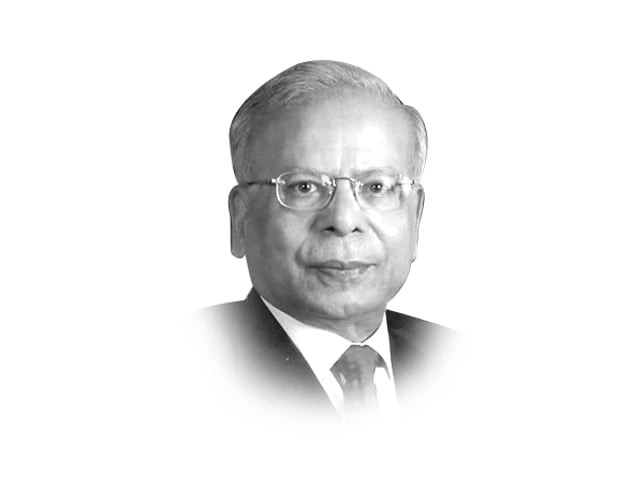Parliament’s role in economic governance
One way to avoid our past mistakes is to strengthen the role of the parliament and its committees.

First is the question-answer session. These sessions should have filled in the gap in the knowledge of the citizens with regard to essential facts about government performance but, in actual practice, they have proved to be no more than perfunctory and ritualistic in nature. Alertness and thoroughness in providing the answers have been substituted by evasiveness and dodginess. Revelation of facts on the floor of the house is one way of removing the mistrust between the government and the public at large.
Second is the appointment process of the chief executives of constitutional, quasi-judicial and key public sector corporations. The nominations by the executive branch for the positions of auditor general, governor of the State Bank of Pakistan, the chairman of the Federal Public Service Commission, etc., should be reviewed by parliamentary committees. The latter should hold public hearings where testimonies by experts can be heard to prove the suitability of the candidates for these positions. Once they are confirmed, the chief executives cannot be removed arbitrarily by the executive till they complete their tenure. This transparent mode of selection and guaranteed tenure of office will take care of a large number of problems that the public sector enterprises are facing today in their management and financial affairs.
Third, the annual budget-making process is more of an exercise of going through the motions rather than a serious examination of the options and alternatives available. The annual budget should be anchored in the Medium Term Budgetary Framework (MTBF) and the executive branch has to justify the deviations, variances and slippages between the goals committed in the MTBF and the actual outcomes in the budgets every year. The parliamentary committees have to consider the draft budget proposals before they are finalised, except that specific revenue and tax measures or any other information that is market-sensitive should be withheld.
Fourth, the economic vision, long-term perspective plan, strategy and medium-term plan and policy documents should be discussed by the parliamentary committees and then tabled before the Senate or the National Assembly for approval. The bipartisan support given to the final plan or policy would ensure — to a large extent — that the successor government would not reverse or abandon it. This assurance of continuity would remove a great deal of uncertainty and unpredictability from the minds of the investors — domestic and foreign.
Fifth, all major international agreements, such as with the IMF, etc., having long-term implications for the economy, should be presented before a parliamentary committee for in-depth review and scrutiny. Independent experts should be invited to provide their assessments. The committees should then prepare and present the recommendations to parliament.
Sixth, there are important pieces of legislation that have repercussions for the economy, for example, the Fiscal Responsibility and Debt Limitation Act which delimits the maximum size of public debt. In case these limits are exceeded, parliament should question the executive. Once the bill amending the SBP Act and placing an explicit ceiling upon budgetary borrowing by the government from SBP is approved, parliament can take the government to task for any violation.
The thrust of the above recommendations is not to limit or take away the powers of the executive branch in any way but to have a check on them. To facilitate this, changes in processes have been proposed to specify the role of parliament and the parliamentary committees.
Some criticisms can be raised about this approach. The government’s decision-making mechanism may be paralysed. This risk can be minimised if the procedures and rules are crafted in a way that the power to delay or veto decisions by parliament is circumscribed. Voting will not be across party lines on these issues, either at the committee level or at the full parliament level. Joint sittings and sessions should be encouraged for debating polices and plans. This process will take more time but as most snags would have been sorted out beforehand, implementation would proceed fairly smoothly. The criticism that the parliamentary committees may not possess the necessary expertise on the subject matter can be overcome by the committees employing full-time professional staff to assist them. The committees can always summon experts to advise them. This combination of in-house staff, outside experts and some parliamentarians already having the experience and competence will overcome this problem. Another risk is that the committees may split across party lines and indulge in point-scoring rather than coming to an amicable resolution of the problems. Limited experience with the existing committees does not lend credence to this view. Convergence and compromises have been reached in many instances by people belonging to different political parties as evidenced by the passage of the 18th Amendment. Intense vigilance by media and civil society and the public nature of the discourse should also act as a deterrent to this tendency.
In the initial days, parliamentary oversight would take twists and turns, would be resented by the executive branch and suffer abuses, excesses and displays of unwarranted power by some of the parliamentarians. With the passage of time, the process, practice and public exposure will seek to strike an equilibrium; and a healthy balance between execution responsibilities and oversight will be reached.
Published in The Express Tribune, December 5th, 2011.















COMMENTS
Comments are moderated and generally will be posted if they are on-topic and not abusive.
For more information, please see our Comments FAQ